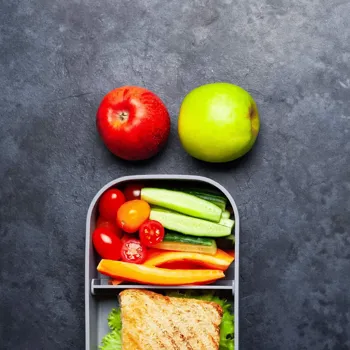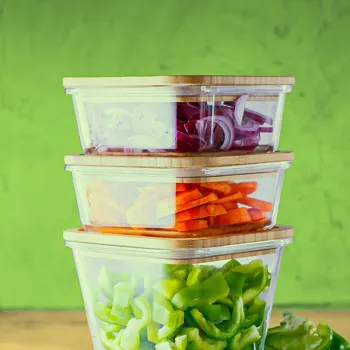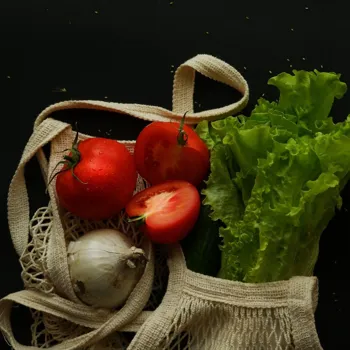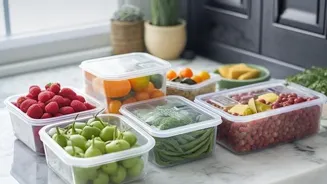Unlock the secret to a balanced meal plan with 8 essential tips! Dive in for a healthier, happier you!
Namaste, readers! Are you tired of the daily "what to cook?" drama? Do you find yourself ordering in because
planning meals feels like climbing Mount Everest? Well, fear not, my friends! Creating a balanced meal plan for the week can be simpler than making chai.
It's all about a little planning and a dash of 'desi' ingenuity. A balanced meal plan will ensure you eat right, saving both time and money, besides keeping you energetic, which is very important. Let's delve into eight tips to get you started on your journey to a healthier, happier you!
Diverse Indian cuisine tips for balanced meal plans
First things first, let's talk about variety. Our Indian cuisine is a rainbow of flavors and ingredients, and your meal plan should reflect that! Don't get stuck in a "dal-roti" rut (though, let's be honest, nothing beats a good "dal-roti").
Incorporate different types of vegetables like leafy greens like spinach and fenugreek, colorful choices like carrots and beetroots, and even gourds and legumes. This variety is key to getting all the necessary vitamins and minerals.
One easy way to achieve this is by dedicating specific days to certain food groups. Let Monday be all about lentils, Tuesday for greens, Wednesday for complex carbohydrates, and so on. This not only introduces variety, but keeps things exciting.
Another simple tip is to prepare a colorful vegetable tray. Carrots, cucumber, capsicum, and broccoli can be chopped, stored, and consumed throughout the week. This will help with immediate hunger pangs, besides improving overall mood.
Practice portion control for a healthier lifestyle - use smaller plates and chew food consciously
The second point to consider centers around portion control. We Indians love to eat, often piling our plates high with delicious food. But remember, moderation is key! Use smaller plates to trick your mind into feeling satisfied with less.

Pay attention to your body's hunger cues; stop eating when you feel full, not when your plate is empty. Include small portions of healthy fats like nuts, seeds or ghee cooked food which will ensure that your body gets all the essential nutrients. Avoid overeating and wasting food.
One thing that will help further is to consciously chew your food for a longer period. It will help you not only enjoy the texture of the food, but also keep your stomach happy and healthy, further.
Further, avoid distractions like phones and television while eating, as that can mislead your mind into craving for more. Ultimately, remember that portion control is not about restricting yourself, but ensuring you enjoy your food in a way that nourishes your body.
Embrace the power of pulses for nutrition and sustainability
Our third tip focuses on the power of pulses and legumes. These humble ingredients are nutritional powerhouses, packed with protein, fiber, and iron. Incorporate different types of "dals" like "toor dal", "moong dal", or "masoor dal" into your weekly meal plan.
You can also explore options like "chickpeas" (chole) or "kidney beans" (rajma). These provide sustained energy and keep you feeling full for longer, reducing the temptation to snack on unhealthy options. Pulses are highly versatile, easily incorporated into soups, stews, and even salads.
Make sure to consume dal at least once a day. To improve taste, one can add a dash of lime or other herbs to make it enjoyable. Pulses are not only good for your body, but also great for planet earth. These are environmentally sustainable, ensuring minimal impact on nature.
The key is to embrace the richness of pulses in your diet with a smile!
Choose healthier carbs like brown rice, whole wheat roti, millets, and sweet potato. Vary intake for balance
Fourth, plan your carbohydrate sources wisely. While rice and roti are staples in our Indian diet, it's important to choose healthier alternatives. Opt for brown rice over white rice, and whole wheat roti over refined flour roti.
In fact, you can add millets such as ragi and bajra, or jowar to your diet. These options have more fiber and nutrients. Another option is to use sweet potato as one of your carbohydrate sources. Experiment with different grains and find what works best for you.
Carbohydrates are meant to fuel you, not slow you down! A smart way to approach carbs would be to vary the intake. One day, you could have brown rice, and the other day, you could have roti.
Combining your dishes with right portion sized vegetables, pulses, and legumes will ensure a balanced intake.
Importance of smart snacking for healthy choices and nutrition
Our fifth tip focuses on the importance of smart snacking. Mid-meal hunger pangs are a common culprit for derailing healthy eating habits. Resist the urge to reach for processed snacks. Instead, opt for healthy alternatives like fruits, nuts, yogurt, or a handful of roasted "chana".
Plan your snacks in advance and keep them readily available so you're not tempted to make unhealthy choices. A banana is one of the best immediate sources of energy, besides being good for the stomach. Yogurt with seasonal fruits is another excellent snack to keep oneself full for longer.
It's important to be mindful of the snacks to ensure overall health. The main idea is to focus on nutrition and a healthy life. Snacking is not a culprit, but poorly chosen snacks are.
Hydration is key for health and energy; drink water daily
Sixth, Hydration is an important factor when planning your meals. Drink at least 8 glasses of water a day. Avoid sugary drinks like soda and processed juice and increase water intake. Fresh lime juice with a dash of salt or sugar makes an excellent hydrating drink.
If you find it hard to maintain the liquid or water content, you can include food items that have high water content, like watermelon, cucumber, and pomegranate. Another option is to use buttermilk. Staying hydrated ensures smooth body function and healthy skin.
It also keeps you energised and detoxifies your body. Always remember to drink water before you eat. The main purpose behind hydration is to keep your body healthy and happy!
Include a weekly cheat day to maintain metabolism and avoid burnout while eating healthy
Seventh, planning out your week should also include a weekly cheat day. This is the day you eat whatever you want and fulfill your desires! You could eat your favorite street food that you have been avoiding all week, or maybe a chocolate!

Cheat days are scientifically proven to keep your metabolism up and ensure that you don't feel burnout when trying to eat healthy. It is important to remember to keep portion size in mind here and don't go overboard with the cheat day.
At the end of the day, you need to remember why you started this journey and remain on course!
Check labels for nutritional info when grocery shopping to match diet goals for quality control
Eighth, and finally, when you go grocery shopping, always check the labels for nutritional information. The nutritional information can help you find the right items that you want to include in your diet that match your goals. Things such as "sugar free", " high protein,""high fibre", etc.

, should be checked. If you are diabetic, remember to check the carbohydrate levels in the food. It is always good to be informed of what you are consuming. This is a habit that takes time to develop so do not be discouraged and keep on trying!
These grocery shopping tips are one of the best ways to ensure quality control while planning your weekly meal plan.
Tips for creating a balanced meal plan
So, there you have it! Eight simple tips to create a balanced meal plan for the week. Remember, it's a journey, not a race. Start small, be patient with yourself, and enjoy the process of nourishing your body with wholesome, delicious food. Khana right, and life will be bright! Happy eating!
AI Generated Content. Glance/InMobi shall have no liability for the content












